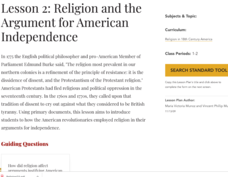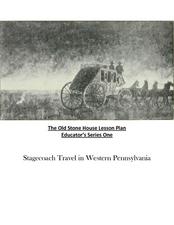Stanford University
Vicksburg
Long before the term fake news, media outlets offered competing narratives of events at the time. Looking at newspaper reports from the Battle of Vicksburg, class members consider two different versions of the strategic siege—one from...
Education World
Black History 104
Who was the originator of the Blood Bank? What fur and grain trader founded the city of Chicago? Who invented the ironing board and lawn sprinklers? A 10-clue matching activity launches a scavenger hunt for information about famous, yet...
Cave Creek Unified School District
Crusades and Culture in the Middle Ages
The Crusades sounds like a glamorous time period in the Middle Ages full of glory—but was it? Scholars find and review the truth of the Crusades' influence on the world through the resource. The study guides, separated individually by...
National Endowment for the Humanities
Lesson 2: Religion and the Argument for American Independence
Young scholars examine how religion affected arguments justifying American independence. They read and analyze primary source documents, and write an essay analyzing how Americans used religious arguments to justify revolution against a...
Curated OER
Old Stone House Lesson Plan
From stagecoach to railroad tracks, your class will discover how advancements in travel in the United States during the nineteenth century played an integral role in the industrialization and development of American society. The main...
University of North Carolina
Art History
Art analysis might help uncover some of life's most puzzling questions, such as the mystery behind Mona Lisa's smile. The handout, from the Writing for Specific Fields series, is particularly useful for those interested in pursuing art...
National Endowment for the Humanities
Lesson 1: The First Great Awakening
High schoolers examine the First Great Awakening and how it affected religious belief in colonial America. They read and analyze primary source documents, explore various websites, and write a five-paragraph essay examining the beliefs...
Worksheet Web
Analyzing the Text
Practice analyzing informational text with a reading passage that details the Great Depression. Scholars read about the impacts of World War I, the Roaring Twenties, and the Depression, then answer 10 true or false questions.
Student Handouts
The Players and Their Games
Explore the countries involved in World War II. Pupils find information about what these countries were like before the war. Who was the leader of each country? What issues, concerns, and goals were important in 1938? They fill in their...
Civil War Trust
Transcribing Civil War History
Primary sources are valuable for understanding the context of historical events, but the diction and dialect in these documents can be difficult to understand. Middle and high schoolers participation in a transcription process in which...
K5 Learning
Musical Instruments to Play
Bring some music to your language arts lesson with a reading comprehension activity. Learners read an informational passage about different musical instruments before answering a series of comprehension and vocabulary questions.
K12 Reader
The Mayflower
The journey aboard the Mayflower in 1620 was long and arduous for the Pilgrims set for the New World. Learn about the difficulties of the expedition, including the extended timeframe and cramped quarters, with an informative reading...
Centers for Ocean Sciences
Ocean and Great Lakes Literacy: Principle 7
Your mission, should you choose to accept it, is to take your class on an underwater adventure. The final installment in a seven-part series involving salt and freshwater bodies takes junior oceanographers below the surface in...
Independence Hall Association
American History: From Pre-Columbian to the New Millennium
Need an online resource to supplement the paper textbook in your classroom? An all-encompassing website covers historical events throughout the last half of the second millenium, leading right up to the third. From the pre-Columbian...
Shakespeare Globe Trust
Fact Sheet: Writing Plays
Who were some of the popular playwrights of Elizabethan England? Using the provided fact sheets, scholars research playwrights, explore three different types of plays, and learn about censorship in Elizabethan England.
Reading Vine
Confucius: The Most Famous Teacher in China
Introduce young philosophers to the wisdom of China's most famous thinkers with a short bio. The reading comprehension passage includes an answer key.
Stanford University
Annexation of Hawaii
Once an independent nation, Hawaii became part of the United States only after a business-sponsored coup of its queen. After examining newspapers from the 1890s, learners consider whether native Hawaiians wished to become Americans at...
National Endowment for the Humanities
Folklore in Zora Neale Hurston's Their Eyes Were Watching God
Learners define folklore, folk groups, tradition, and oral narrative. They identify traditional elements in Their Eyes Were Watching God Analyze and understand the role of traditional folkways and folk speech in the overall literary...
Other popular searches
- Medieval Historians
- Art History Historians
- Historians as Detectives
- Tools of Historians
- Historians Past
- Art History and Historians
- Function of Historians
- Historians and Time Periods
- Archaeology and Historians
- Archeology and Historians



















